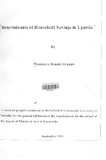| dc.description.abstract | The recent economic fluctuations, climate risk and a number of individual specific shocks leave households vulnerable to severe hardship in especially developing countries. Moreover, the credit and insurance markets are limited and the social coverage is weak. In this context, households' saving is crucial to provide an insurance against the economic and social shocks.
Additionally, a better knowledge of households saving behaviour could develop the untapped potential to locally mobilize and fmance investment expenditure in order to fuel selfsustained economic growth and development. This study discusses the ability, willingness and opportunities that influence households in Uganda to save and reviews policy options to boost domestic saving mobilization to fund investment expenditure self-sustainably. It examines the socio-economic and demographic determinants of household savings-in Uganda.
The study contributes to literature by empirically analysing the relative importance and direction of each variable in explaining household saving behaviour using the most recent Uganda National Housing Survey data and this should be helpful in designing appropriate policy tools to effectively boost domestic savings mobilization. The framework for analysis uses both descriptive statistics and the estimation of a household saving function using ordinary least squares.
The results of the analysis show that household savings in Uganda rise significantly with an increase in both household income and net assets. The study further observes a uniform saving rate between urban and rural households in Uganda. Finally, demographic and social factors like sex and literacy of the household head, location of the household also significantly influence household saving behaviour in Uganda. JEL classification: E21, C3 C21, D12,D91 | en_US |

